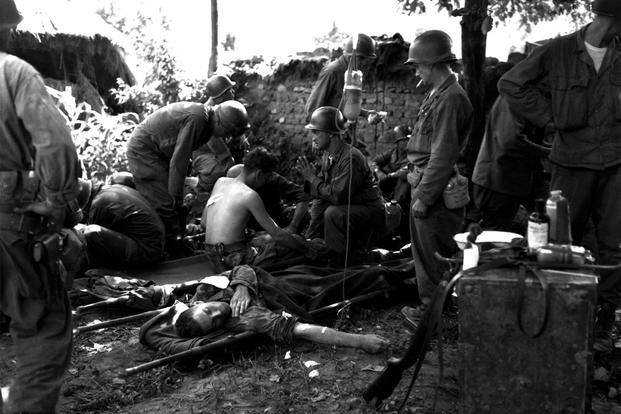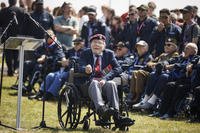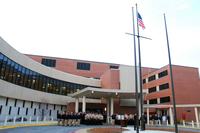My name is Dr. Bernard S. Feinberg, and I am an American. I was born July 17, 1912 in West Hoboken, New Jersey. I volunteered for the first draft, November, 1940. I was inducted January 31, 1941 and entered the service through Ft.Dix, New Jersey. My basic training was at Ft. McClellan, Anniston, Alabama. I was a private for seven months. In August of '41 I received a commission as a first lieutenant in the U.S. Dental Corps. I am a graduate of the University of Pennsylvania Dental School, class of 1936.
You may wonder why I, a practicing dentist, volunteered to go in as a private. I would have liked to go in as an officer, of course, but the table of organization, TO, at that time had no use for more DDSs. As the Army expanded, the need for officers grew. Secondly, I was and am a very patriotic American and also a Jew who had no use whatsoever for that Nazi bastard Hitler and his overall plan of genocide for my people.
As for D-Day and the few preceding days, June 1-6, 1944: I arrived at the U.K. through the Firth of Forth on the Queen Elizabeth, January '43. As you know, I was with the medical attachment, 116th Infantry Regiment, 29th Division. We were picked out and given the distinct honor of making the invasion of France on June 6, 1944, on Omaha Beach, Normandy. I was a captain at the time, regimental dental surgeon.
We boarded the Charles Carroll, the communication ship for the invasion about June 2 or 3. After spending about one week in isolation at a marshalling area in camp in Plymouth, going over and over the plans for the invasion called Overlord, as you know. We were well-trained, well-prepared, having gone through two to three problems at Slapton Sands, England, simulating exactly the conditions, terrain, and so forth, we were expected to find on Omaha Beach, Normandy, June 6, 1944.
0001 hours June 6, I was in a stateroom with about 16 other officers in full battle dress. Some officers lying on bunks getting 40 winks. Others writing letters, others contemplating praying. I remember my distinct wish not to be killed on June 7, my niece's birthday.
We all went on board about 2:30-3:00 A.M. to prepare to disembark down rope ladders to our LCI. Waiting to go we saw and heard the thousands of planes flying overhead across the Channel to bomb the various targets. Before we went overboard, we got General Eisenhower's message, public knowledge.
At about 4:00 A.M., we debarked down rope ladders, fully equipped, 65 pounds on our backs. Gas masks, first aid kits, Red Cross brassards on arm, no rank on shoulders and so forth, into our LCI. Litter bearers had litters. We circled for about one hour or so, always moving closer to shore. About one quarter mile from shore, Omaha Beach, our Navy driver straightened out and went in.
We landed 20 minutes after H-Hour, which was 6:00 A.M. We landed H+20, or 6:20 A.M. We were taking constant fire from batteries and pill boxes on shore. Machine guns, artillery, and so forth. Our LCI was extremely lucky: no casualties. From what I saw, the others were not so lucky. Men and material in the choppy water, drowning, dying, yelling for help.
Our ramp dropped open and we ran off in disciplined order, no panic. Training paid off. Waist deep in water. Rushed onto the beach, which was strewn with our dead and wounded, plus those floating in the water. Our medics became busy immediately, giving First Aid and so forth. Coming off the LCI, our radio man, Private Jerry Greene -- more about him in an anecdote later -- was shot through his thigh muscle, upper arm muscle, and nevertheless with his radio on his back dragged a wounded buddy onto shore and saved his life, for which he was awarded purple heart, silver star -- the latter posthumously.
We all tried to get to bottom of hill for protection. We were being fired on with everything conceivable, unmercifully and witheringly, from enfilade fire from above and to the right and left. In our distinguished unit citation award, first one given to any unit on 16th Infantry Regiment for the assault of Omaha Beach, it is said we took 800 casualties, dead and wounded, that first day.
Meanwhile, we could see to the north of us to Ponte du Hoc, the steep cliff on which our 29th Rangers were assaulting. For the first few minutes or so, they and our infantry were exchanging fire, until communications straightened that out. We were pinned down for about five or more hours. If the tide were coming in instead of going out, we would have been drowned.
About 12:00 noon or so our first tanks came on shore. What a beautiful sight. About 2:30 P.M. saw first Nazi prisoners, another beautiful sight. Also more men and material all up and down the beach were arriving, the remainder of our regiment.
Meanwhile, Brigadier Dutch Cota, our assistant divisional commander, was all over the place after shouting those famous words. Can't quote. I heard them but forgot them anyway. Something like this: "No sense dying here, men. Let's go up on the hill and die." And with these words, he started to tap soldiers on their butts and said, "29 -- Let's go!" Our divisional yell. And I was one of them. I refer you to the movie "The Longest Day" shown every D-Day for a real accurate pictorial account. You must see it. I feel sure you have.
We went up the hill on the way to Vierville sur Mer, taking much fire. Saw many Nazi dead all the way. We arrived at liberated Vierville sur Mer and spent the night in trenches about five and a half feet deep, evacuated by retreating Nazis.
We looked into the English Channel and saw our ships shelling inland, also our planes flying overhead. This, by the way, going on all day. Air Force did tremendous job of flying sorties inland all day and night. Nazis had one plane: Bed Check Charlie. Useless.
And so ended the first day for us, the 116th Infantry Medical Attachment, 29th Division, then to sleep. To go back. We must have eaten on the attack in going forward. I ate fig bars. We had C-rations also. From here on may not be exactly what you wanted, but before I give you the anecdotes, I'll give you these interesting -- to me -- bits of info.
All the West Pointers I knew in my regiment did their duty and more and brought honor to the Academy. For instance, our regimental commander, Colonel Charles Durwood Canham, later to become Brigadier General Assistant Commander 28th Division, then Major General Commander 28th Division, then retired as Lieutenant General, he ran off the LCI ramp, took a bullet in his wrist, stopped to have it bandaged, and never stopped leading the men, and never stopped leading the men and leading his troops. Always in front. In fact, he was reprimanded for having his command post too far forward.
Major Sidney V. Bingham, later colonel and retired as brigadier general, wounded, taken to hospital, treated, and ran out of hospital to be with his men.
Anecdote: Major Bingham and I were standing on a hill. He was looking for snipers. One had just killed our new Colonel Phillip Doyle. All of a sudden I heard a ping, a bullet. I dove to the ground. He never moved. He said, "What a lousy shot." That's what I call cool.
Anecdote number two, very very sad. This is about the Private Jerry Greene I mentioned earlier. I used to sit with him every noon time we could in his radio car and listen to the 12:00 news. The one time I missed, the Nazi bastards vectored in on his radio and mortared it. He was mortally wounded. I rushed to his side, did what I could, jeeped him to the collecting company. They couldn't save him. All the way to the collecting company he was calling for his mother. As I said before, he received a cluster for his purple heart and a silver star for his bravery on the landing on Omaha Beach, posthumously. That's it.













